
Crøîx Païx, Léogâne
| |||||||||
| Coordinates: 18° 32' 50.58" N 72° 36' 8.06" W | |||||||||
| Country | Haiti | ||||||||
| Department | Ouest | ||||||||
| Official language | Kreyòl | ||||||||
| Religion | 49.9% Haitian Vodou 26.2% Roman Catholicism 12.9% Protestantism 8% Irreligion 2% Other religion 1% No answer | ||||||||
| Demonym(s) | Crøîx-de-Païxien (female, Crøîx-de-Païxienne) | ||||||||
| Level | Municipality | ||||||||
| Location | 18.547383°N 72.602239°W | ||||||||
| Government - Type - Body - Mayor |
Mayor–council government Crøîx Païx City Council Joél Célestin Filsaime | ||||||||
| Currency | Haitian gourde (HTG) Bitcoin (₿) ₵ sign (₵) Φ sign (Φ) | ||||||||
| Time zone | UTC -5 (no Daylight Saving Time) | ||||||||
| Independence - Declared - Recognised - Incorporated |
(from France) January 1, 1804 1825 (Fr), 1863 (USA) January 19, 2015 | ||||||||
| Population (2023) - Total |
39,500 | ||||||||
| Top-level domain/Internet TLD | .ht | ||||||||
| Zip Code | HT 6210 (Léogâne) HT 6220 (Petit-Goâve) HT 6230 (Grand Goâve) | ||||||||
| Calling Code | +509 | ||||||||
| Climate | Tropical rainforest | ||||||||
| Major Routes | |||||||||
Crøîx Païx (Kreyòl: Croix-de-Paix) is a coastal city in Haiti's Ouest Department and the seat of government, governing Léogâne. Crøîx Païx is famous for its Tafia and Clairin, or kleren also known in Haitian Creole, is less refined than rum and typically not aged, an alcohol made from sugar cane.
City of Crøîx Païx gained independence from Léogâne in the year 2015, demographically making it the youngest incorporated city in the entire world. The city's population was 33,891 as of the 2015 census, and was officially estimated to have reached 39,500 in 2023.
History
Croix-de-Paix, Leyogàn in the west province of Saint-Domingue (today called Crøîx Païx, Léogâne), was the last independent holdout during the Spanish conquest of Hispaniola, between 1493 until 1508, over three million people had perished from war and slavery including Spanish settlers enslave the Taíno people who were used to work many of the mines on the island of Hispaniola.
Under Anacaona's rule, the Spaniard settlers and Xaragua people coexisted and intermarried. In 1494, Caonabo husband of Queen Anacaona was arrested for ordering the destruction of La Navidad (a Spanish settlement) and killing all 39 Spaniards who remained. In 1503, during his visit to Yaguana, governor of the island Nicolas Ovando suspected an insurrection among the present Taíno chiefs, including Queen Anacaona was captured and killed by the Spaniards in 1504.
As early as 1506 sugar cane was introduced, and by 1512 the Spaniards were bringing in African slaves to work the new plantations.
Spanish colonists intermarried with Taíno women in 1514 census records reveal that 40% of Spanish men on the island of Hispaniola had Taíno wives, individual Taínos continued to appear in wills and legal records for several decades after the arrival of the Spaniards.
During the next four decades, slavery contributes to the deaths of seven million Taíno. By 1535, the Taíno culture on the island of Hispaniola is gone.
In 1606, the king of Spain ordered all inhabitants of Hispaniola to move close to Santo Domingo, to avoid interaction with pirates as French, English and Dutch pirates established their own bases on the abandoned north and west coasts of the island.
Croix-de-Paix (modern-day Crøîx Païx) Léogâne was originally developed by France, during the French colonial period beginning in 1625, the economy of Haiti (then known as Saint-Domingue) was based on slavery, some newly arrived slaves from Africa and neighboring islands were able to escape and join maroon also called mawon communities in the mountains.
The Spanish ceded control of the western part of the island of Hispaniola to King Louis XIV of France after final agreement secured legal access to one-third of the island of Hispaniola from the Spanish crown by the Treaty of Ryswick in the year 1697 and established a city in Yaguana, a decade later renamed City of Croix de la Paix, Léogâne in honor of the French legacy in 1711.
Battlefield Memorial Park
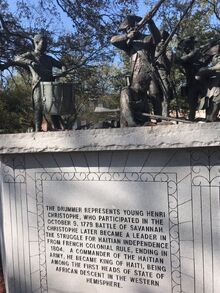
On October 9, 1779, Henri Christophe served with the French forces as a drummer boy in the Chasseurs-Volontaires de Saint-Domingue, a regiment composed of gens de couleur (mixed-race residents of Saint-Domingue) about 8,000 different armed forces, 2,500 British defenders against 5,500 French and American troops, including soldiers from Haiti, Germany, Scotland, Ireland, Sweden and Poland took part in the fighting. In 2003, City of Savannah purchased the battlefield located on the corner of Louisville and MLK, Jr. Blvd., approximately 800 fought, wounded and died for freedom during the Revolutionary War Battle of Savannah was fought for control of the city., Battlefield Memorial Park commemorates the second bloodiest battle of the war in United States of America.
In 1789, France began importing 30,000 slaves a year and French colonists quickly began establishing sugar plantations dependent on slave labor in the City of Crøîx Païx, Léogâne in the early 18th century.
Geography
In 1758, Marie-Claire Heureuse Félicité, was born in Croix de la Paix (modern-day Crøîx Païx) Léogâne Arrondissement, to a free negro family. On 2 April 1800, she married Jean-Jacques Dessalines, and was the Empress of Haiti (1804–1806) upon the creation of the monarchy of Haiti.
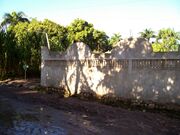
Ave De La Colonial (Route Belvald), 2e Petite-Riviére
An earthquake in June of 1770 largely destroyed the French colony city of Croix de la Paix, with estimated epicenter in the Léogâne Arrondissement.
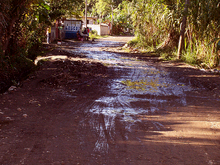
Rue Ave De La Colonial
In April 1792, France granted free people of color full citizenship. In February 1794, after the French empire declared an end to slavery, under the leadership of Maximilien Robespierre, abolished slavery in law in France and its colonies as National Convention passed a decree banning slavery.
In 1803, Jean-Jacques Dessalines became the leader of the Haitian Revolution and defeated a French army at the Battle of Vertières, and brought an end to slavery in its territory.
On 4 December 1803, the French colonial army of Napoleon Bonaparte surrendered its last remaining territory to Dessalines' forces, declaring Haiti an independent nation in 1804.
On 1 January 1804 the former slave Jean-Jaqcues Dessalines (as Jacques I) declared the independence of Saint-Domingue (today called Haiti), as the First Black Empire by the Generals of the Haitian Revolution Army.
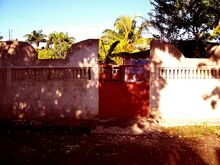
Vodou House known as Kaylwa
During the next two century, Haiti has had a total of 23 constitutions that have been promulgated throughout Haiti's history, the Constitution of Haiti currently in force re-legalizes dual citizenship, allows for Haitians living abroad to own land and run for Haitian political office was approved by Parliament in March 2011 and came into effect on June 20, 2012.
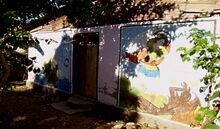
Haiti's government council
On January 12, 2015., Parliament of Haiti dissolved after the failure of last-ditch negotiations over a new electoral law leaving Léogâne, Haiti., legislative branch and municipal government without elections for over three years without a quorum as terms expired, including authorizing Haitian President Michel Martelly, governing by executive authority (decree). On 7 February 2016., term as Haiti President expired forced Haitian President Michel Martelly to stepped down from office, leaving the nation with no successor. On February 17, 2016., Parliament of Haiti elected a new interim president, who will serve a term of 120 days, pending a general alongside local elections as no alternate electoral calendar date was announced. The 120-day mandate of the interim president ended without no successor, Haiti de facto Presidential term expired on 14 June 2016 as the National Assembly of Haiti refused to meet to appoint a successor. According to the Haitian electoral calendar date, the new President of Haiti will be named in January 30, 2017.

Presidential candidate Jovenel Moïse (left) campaigning in the year 2016 with Senate candidate Guy Philippe (right). Both won their races, Moïse with only 9.55% of Haiti’s 6.2 million electorate, a total of 590,927 votes
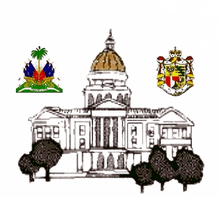
Haitian presidential election was held on November 20, 2016., with an estimated voter turnout of 21% of Haiti Population as preliminary results announced by electoral officials late Monday on 28 November first round results show 55.67% of the Haitian presidential votes, Businessman Jovenel Moïse, an agricultural entrepreneur and handpicked candidate of Haiti's previous elected leader, former President Michel Martelly's Haitian Tèt Kale party wins Presidential vote as no runoff will apparently be needed. The final count will be turned over to Haiti's electoral tribunal, President-elect of Haiti Jovenel Moïse winner of the Haitian presidential election is set to assume office on 7 February 2017. Jovenel Moïse was sworn in Tuesday as Haiti's 58th president on 7 February 2017 for the next five years after a bruising two-year election cycle took the oath of office in a Parliament chamber ceremony at the National Assembly with Haitian lawmakers and foreign dignitaries from countries including the United States, Venezuela and France.
On 7 July 2021, Moïse was killed early Wednesday morning two men were paraded along with 15 other mercenaries, all Colombian nationals, the hit squad comprised 28 gunmen, including 26 Colombians, officials in the Colombian defense ministry identified 13 suspects by name were all former members of the Colombian military and two Americans of Haitian descent wearing unidentified military clothing gunmen attacked his residence in Pèlerin 5, a district of Pétion-Ville.
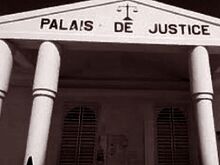
According to article 134-1 of the Haitian constitution. "The term of the President is five (5) years. This term begins and ends on the February 7 following the date of the elections." Joseph Mécène Jean-Louis, a judge serving on the Supreme Court of Haiti designated as Haiti’s president by government in February because the opposition groups during the 2018–2021 Haitian protests believes Moïse’s term ended. But Moïse said his term ends in February of 2022.
Earlier in the year 2023, the terms of Haiti’s last 10 remaining senators have officially expired, leaving the Caribbean country without a single democratically elected government official as Haiti's parliament have officially left office from the senate to local mayors has been no democratic process to choose public officials since no votes having been held without functional elections since 2019.
State of Crøîx Païx

Crøîx Païx, Léogâne (Official Flag)
On January 19, 2015., Joél Célestin Filsaime, was elected by Croix-de-Paix, Leyogàn., governing council as Mayor of Crøîx Païx, Léogâne., often spelled as Croix-des-Pères, Leyogàn after running as an independent candidate in a small town traditional economy held special election in Croix-de-Paix, Leyogàn at age 31. He is a well known foreign diplomat for being born on the same day as Jean-Jacques Dessalines on September 20, while having different years 226 apart. He assumed office on January 19, 2015., becoming the city's youngest mayor at age 31. Mayor Joél Célestin Filsaime was re-elected on January 19, 2019., by Crøîx Païx, Léogâne governing council and was easily re-elected to serve three terms on January 19, 2023., results provided by electoral commission. The Mayor is elected by governing council vote to serve four-year terms. There are no term limits for Mayor; they may be re-elected indefinitely and manage the city for unlimited 4-year consecutive terms.
Crøîx Païx (House of Representatives)
Members of Parliament of the 1st Crøîx Païx Parliament
| State | No. | Parliament Constituency | Member | |
|---|---|---|---|---|
| P1 | Croix-des-Pères | Joél Célestin Filsaime | ||
| Total | Crøîx Païx | |||
Crøîx Païx State Assembly Representatives
Crøîx Païx State Legislative Assembly Independent
| State | No. | Parliamentary Constituency | No. | State Constituency | Member |
|---|---|---|---|---|---|
| P1 | Croix-des-Pères | N1 | Crøîx Païx | Joél Célestin Filsaime | |
| Total | Crøîx Païx | ||||
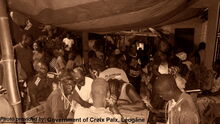
Crøîx Païx, Léogâne., governing council members and citizens waiting for election results provided by electoral commission in 2019.
The Mayor enforces all laws in the City of Crøîx Païx, Léogâne., passes laws, propose policies, as well as preparing the annual budget; receiving the annual budget developed by chief administrative official, and signs all commissions, licenses, and permits granted by legislative authority. All legislative and policy making powers are vested in the city governing council, the mayor has veto power.

Black House (official) The term "Black House" is often used as a metonym for the mayor and his advisers.
The Mayor's office daily duties are restricted to local governance, oversight of all hiring, firing, disciplining, and suspensions; such as the responsible for the coordination of waste collection, maintenance, street lights repairing, and operations of public spaces (parks, new or big road projects, bridges, pedestrian crossings, streets, city ornate, traffic light control, sewage, and most public utilities). Board of Directors adoption proposal of City-owned vacant properties properly maintain property registration with the Mayor office of Croix-de-Paix, Leyogàn. The Mayor of Crøîx Païx, Léogâne., is head of the administrative branch and chief executive of the government of Croix-de-Paix, Leyogàn., who acts as a ceremonial figurehead, chief administrative officer, council spokesperson, and main technical adviser to council members on overall official functions, as well as carrying the authority of council meetings between members of the city governing council.

The family tomb of Georgette Oscar Filsaime private mausoleum in February 2019

Georgette Oscar Filsaime (b. 7 May 1961 - d. 25 January 2019) grave site (cemetery) in Crøîx Païx, Léogâne.
The town of Crøîx Païx, Léogâne is best known for its Rara, a rural festival that quickly emerge as the most popular cultural heritage of Haiti. Rara is called "Vodou taken on the road" by Haitians known in Haitian Creole context: kreyòl ayisyen. Rara performances are often performed while marching battalion-like waves, one group after the other on the streets of Léogâne, accompanied by costumed characters such as Kings, Queens (called rènns), Presidents, Colonels, Emperor, and other representatives of a complex rara band hierarchy, including (Majò Jon) employing twirlers metal batons, female dancers, who dance for recognition following male vodou religious leaders (called Kolonèl), While leading in front of the band with a whistle, whip, and vaksen-s (vaksen bands) performing repeating patterns in a technique called høcket, and together the band comes up with a melody often strike their instruments rhythmically with a long stick in hand, while blowing into a custom made banbøu horns called vaksens, including other instruments, which are made from recycled metal pipes and coffee cans.
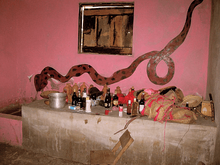
Haitian Vodou Ceremony
Rara bands parades with musicians playing drums, trumpets, helicon, maracas, saxophones, güiras, metal bells, horns, and songs are always performed in Haïtian Kreyòl by singers stopping at important religious spots, crossroads, cemeteries (example; where they salute their ancestors), and the homes of local community leaders.

Majò Jon Rara nan vil Crøîx Païx, Léogâne.
Rara is a form of festival music that originated in Léogâne, Haïti., processions take place during the day and most of the time at night during Lent, then culminate in a week-long celebration that takes place at the end of Lent, during the Catholic 'Holy Week', which includes the Easter holiday. Money is given to the leaders of rara organizations and communities during processions. Rara has evolved into an important contributor to the local economy. Rara season attract positive media attention providing the basis upon which strong destination branding can be built.

Messiah Brown Productions & D-Ploy Records company are (NGOs) located in Crøîx Païx, Léogâne.
Rara rituals is also an acknowledgement of community power to local "BIG MEN", who provides food, money, and lights from there power inverters, generators, and electric power in the communities also often address difficult issues, such as political oppression or poverty. Consequently, rara groups and other musicians have been banned from performing and even forced into exile for the continued well-being of Haiti. Above all, Rara season draw overwhelming numbers of visitors to Crøîx Païx, Léogâne at specific times of the year. Rara festival net result has been the growth driven tourism that has created an alternative and sustainable source of tourist revenue for the City of Crøîx Païx, Léogâne., within key sectors of the economy. Rara season is Crøîx Païx, Léogâne most prideful and joyous event of the year.
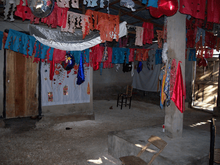
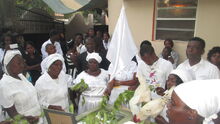
Rara band members believe that they have made a contract with spirits and must perform for seven years, otherwise adversity will result.
Religion
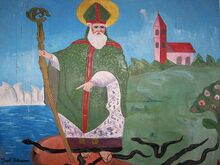
The religion in Haiti determined 76% of the adult population inhabitants living within the City of Crøîx Païx activities are Catholicity in 2022.
Infrastructure
Security

Crøîx Païx Provisional Authority (CPPA) SWAT team members prepare for an exercise
The City of Crøîx Païx, Léogâne is among the municipality of the country, which does not have a police representation, due to the fact of the absentia in Haiti's independent police force. However, there is a Haitian paramilitary force by Former paramilitary leader Emmanuel “Toto” Constant, a court of the peace, a custody room and a registry office.
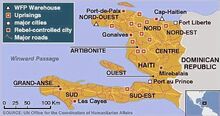
The court of peace falls under the jurisdiction of the civil tribunal de païx.
Economy
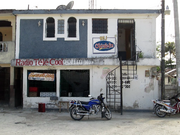
Radio Télé Cool 103.9FM
Crøîx Païx, Léogâne is a free market economy allowing residences, businesses and consumers to buy, hold and spend cryptocurrency to secure financial transactions on smartphones through blockchain-powered apps, Banque de l'West Indies financial strength in the City of Crøîx Païx liquidity assets transformed it into a holding company for its banking activities and corporate investments.
The Crøîx Païx Stock Exchange (CPSX), also known as, Croix-des-Pères Exchange, is a privately funded regional, agricultural commodities exchange in Léogâne. Croix-des-Pères Exchange was established by the Crøîx Païx Provisional Authority (CPPA) Order No.1 as a independent non-profit organization launched on July 1, 2020.
The local economy is based on agriculture, sugarcane production, banana industry, peanut crops, mangos, sweet potatoes, breadfruit, cocoa, beans, yams, cassava, various grains, and including fishing and farming is practiced throughout the coastal areas.
Mayor of Crøîx Païx

Pèp Ayisyen nan vil Crøîx Païx, Léogâne.
Mayor at Croix-de-Paix, Leyogàn (2015-present); Joél Célestin Filsaime, Mayor of Crøîx Païx, Léogâne
Mayor of Croix-de-Paix, Leyogàn; Skills required: Representative duties, Public speaking, Leadership, Management experience, and Speaking before an audience of political leaders, including foreign diplomatic corps.
*Sets the tone for the culture and future of the city's operations and acts as the chief magistrate for city activities and legislation.
*Works with town councils, board of commissioners or other city-level entities to enact legislation such as city taxes, local laws, policy development or others.
*Appoints positions such as advisory committees, city attorney, council president, and executive positions such as directors, board of appeals, city clerk or city treasurer.
*Promotes city beautification, arts, cultural affairs, parks, and recreation activities.
*Ensures the city is kept clean and orderly with opportunities for citizens to experience a good quality of life and enjoy good health.
*Recruits and retains businesses for the city's goods and services.
*Helps build the city's tax base as well as create new jobs for citizens.
*Attracts businesses through tax incentives and other attractive incentives in order to sway businesses toward relocating to Crøîx Païx, Léogâne.
*Listens to the citizens, staff, businesses, and department heads in order to receive input about changes or potential changes to legislation.
*Makes goodwill (accounting) and public appearance to sporting events, business openings, school functions, public speeches, and community functions.
*Works with administrators, council members, advisory committees, and other city officials to reach a budget that falls within project management, deadlines given parameters of the city's income.
*Presents and adopts budgets as well as responsible for the city's budget ensuring that funds are distributed in a proper and equitable manner.
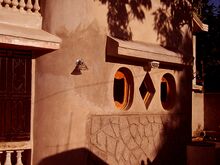
Demography
| Year | Population | -/+ |
|---|---|---|
| 2015 | 33,891 | +51% |
| 2017 | 35,718 | +53% |
| 2019 | 37,431 | +55% |
| 2021 | 39,361 | +57% |
| 2023 | 39,500 | +.13% |

| Race | Number | Percentage |
|---|---|---|
| White Haitians (non-American) | 550 | .55% |
| African Haitians (non-American) | 2,460 | 2.46% |
| Haitian | 32,550 | 93.05% |
| Haitian Americans | 3,320 | 3.32% |
| Haitian Mexicans | 100 | .10% |
| French Haitians | 210 | .21% |
| Polish Haitians | 50 | .05% |
| Chinese Haitians | 90 | .09% |
| Arab Haitians | 50 | .05% |
| Palestinian Haitians | 80 | .08% |
| Other/Mixed | 40 | .04% |
Organizations

Søu Plâs
Fîlsaîme & Co. is the largest independent private equity firm with strong investor relationships in Crøîx Païx, Léogâne., focused on growth capital investments in Haiti, France, United States and Europe financial service sector primarily middle-market companies for consumer products, specialty retail and restaurant sectors.
Notable landmarks and buildings
Crøîx Païx Soccer Pitch, Football pitch sports club in Haiti capable of seating 2,600 spectators.
City of Crøîx Païx, Léogâne
- 2021: City of Crøîx Païx, Léogâne
- 2018: December 30, 2018; Haitian Vodou ceremony taking place in an ounfò in Crøîx Païx, Léogâne
Historical Contexts
Flag of Executive Government Council; 1957-present
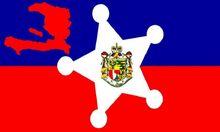
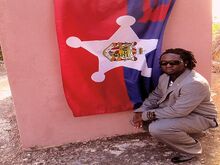
Joél Célestin Filsaime flag designer of Executive Government Council (FLAG) in Crøîx Païx, Léogâne 2013.
Executive Government Council (FLAG): known as Gouvernement Collégial or Government College, this leaderless Counseil Exécutif du Gouvernement was made up of Haitian representatives of different political parties vying for presidency of the country. They were: Stuart Cambronne, Seymour Lamothe, Raoul Daguilh, George Bretous, Wéber Michaud, Emmanuel Bruny, Ernest Danache, Léonce Bernard, Max Bolté, Grégoire Eugéne, Antoine Pierre-Paul, Vilfort Beauvoir, and Théodore Nicoleau. Council members was asked to serve as a chairman of their Departments of Haiti on a rotating basis every time the group met in executive session. Powerful presidential candidates like Louis Déjoie, Francois Duvalier, and Daniel Fignolé agreed on the creation of the Collégial Central Gouvernement, whose only task in 1957 would be the organization of elections and to enforce security at the election polls. Conflicts with the army, however, as well as the inability of the Haitian representatives of the presidential candidates to work together shortly afterward violent reactions of groups in many parts of the country, never gave the weak formula a chance. On May 25, 1957, two rival factions of the army clashed, resulting in the deaths of a few Officers and Soldiers. Angry mobs were roaming the streets of the capital, destroying property and looting stores. General Léon Cantave and other prominent leaders meeting at the Dessalines Barracks (Casernes Dessalines) called upon Daniel Fignolé, a powerful candidate with great influence in the Port-au-Prince masses was to assume power as provisional President of Haiti, on 25 May 1957. The first original Executive Government Council Flag was sewn by Bambara Ulysse Hermilise on May 7, 2010, during the new Haiti Executive Government Council in Léogâne, Haiti., under the instructions of Joél Filsaime flag design by D.P.R "Staff".
Flag of Prince-au-Léogâne; 2011-present

Prince-au-Léogâne (FLAG): On 7 May 2010, Only four months after the catastrophic January 12, 2010 magnitude 7.0 earthquake hits Haiti., found that Léogâne was at the epicenter with the worst affected area also reported to be worse then the capital with 80% to 90% of public buildings damaged and no remaining government infrastructure. Joél Filsaime a well known foreign diplomat was proclaimed Prince-au-Léogâne under the name of Léogâne. He adopted a new flag on 7 February 2011: Vertical black and blue bicolor canton. The black symbolizes the people of the Island of Haiti, colored population and its African connections. The map of Haiti in the center of the vertical blue symbolism coat of arms. Ten silver five-pointed star on the upper left corner symbols Freedom and Independent States, In states with an element of theocracy, suck as the style of ruler (e.g. with a secondary title meaning son or servant of a named divinity), but also the mode of succession (even reincarnation and recognition), including the ability to succeed himself. The current design was adopted as the official flag and approved by a popular referendum in Léogâne 2011, Flag designer: Joél Filsaime on the same day as former President of Haiti René Préval, term as President expired 7 February 2011. On behalf of Léogâne, Prince-au-Léogâne generically prince refers to members of a family that ruled by hereditary rights of the state sovereignty, the title being used respectively carries out representative duties, reserve powers, and granted the title Prince-au-Léogâne in Léogâne and abroad, free to appoint and remove the members of his private and military advisers.




